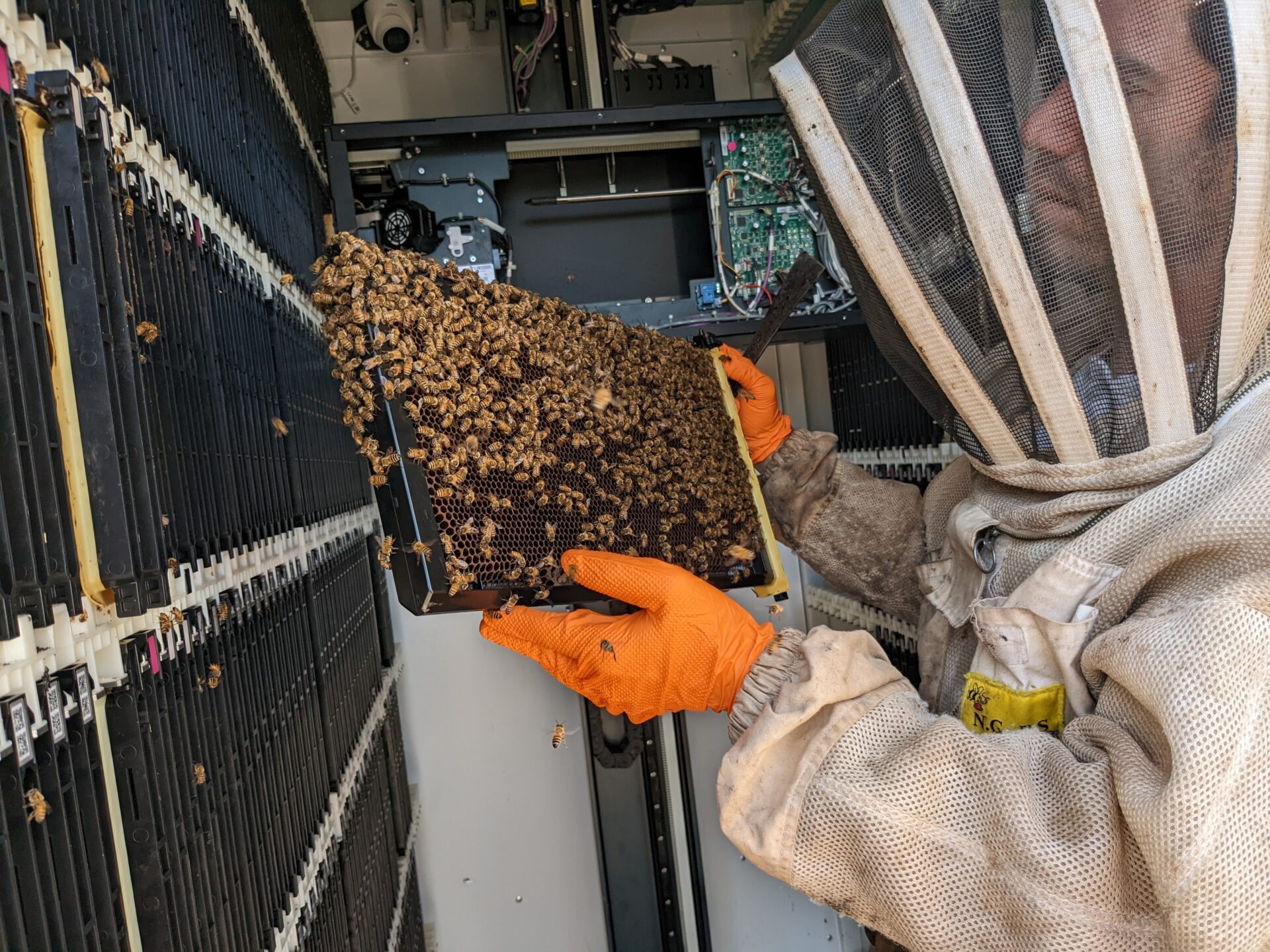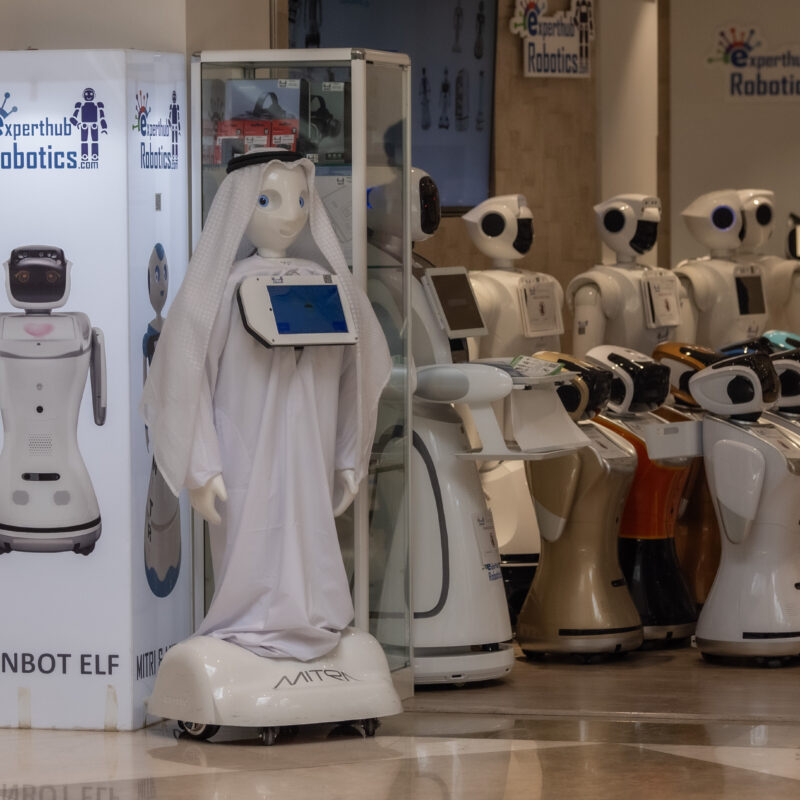Robotic hives keep bees working hard for the honey
Israel’s Beewise takes on global phenomenon of collapsing bee colonies amid threats from global warming, parasites and pesticides

Beewise
Beewise system organizes hives on individual shelves, monitored by cameras, computers and sensors
BEIT HAEMEK, Israel – Beekeepers around the world are engaged in a desperate battle for survival. Devastated by rising temperatures, pesticides and mite infestations, honeybee colonies are collapsing in record numbers. More than 35% of the world’s bees die each year due to “colony collapse disorder,” in which entire hives perish at once.
An Israeli startup aims to help commercial beekeepers deal with the phenomenon through the use of robotic hives that employ artificial intelligence to maintain optimal conditions, in hopes of helping bees survive the modern world.
“If every hive would have its own beekeeper 24/7, you wouldn’t see colony collapse at all,” Saar Safra, the CEO and co-founder of Beewise, told The Circuit. “This is what the robot does.”
The beehive disorder derives from several interconnected issues: global warming, lack of biodiversity, pesticides, pests and diseases that developed in the past 50 years against which bees have no natural defenses. Beewise has developed a self-contained colony of hives, powered by solar panels and connected with Bluetooth, that enables a small robotic arm, equipped with cameras and precision sensors, to monitor a group of hives for common problems. The “BeeHome” can also harvest the honey automatically and collect it in a dedicated container.
“Imagine a bee leaves the hive and goes foraging. Then she’s poisoned by pesticides. Then it gets really warm, so she’s boiling. And then she gets back home, and there’s not enough food because there’s a lack of biodiversity. She doesn’t have a chance.” Safra said.
Since its founding in 2018, Beewise has raised about $120 million from venture capital firms including New York-based Insight Partners, Corner Ventures, based in Palo Alto, Calif., and Tel Aviv’s Fortissimo Capital and Lool Ventures. One of the investors is Sanad AD, a VC based in Abu Dhabi, capital of the United Arab Emirates, where the climate is especially challenging. Sanad AD, which launched in 2015, has investments in health care, real estate, automobiles, emerging technologies and security.
Bees can’t survive in the UAE during the summer. Many Gulf states practice seasonal beekeeping, purchasing bees in the fall for their winter crops and then letting them die in the summer. In the BeeHome, the bees can “oversummer” inside the hive, receiving sugar water rather than going out and foraging, with the thermostat keeping the hive at a survivable temperature, so they can reemerge once the weather cools. Bees in colder climates in Europe and North America are used to “overwintering,” when they stay inside their hives and maintain the temperature at 35 C (95 F) by beating their wings.
In a lychee grove outside Kibbutz Beit HaEmek in northern Israel, the bees don’t look like they’re using cutting-edge technology. They’re buzzing away, setting off from the Beehome to forage or returning to the structure with bright yellow pollen on their hind legs. The entrances are close together, but bees can identify their hive based on the pheromones of their queen and their color-coded entrance in purple, orange and green (Bees can’t identify other colors, like red).
It’s inside the hive where the tech comes into play. Honeycomb frames are arranged like a library, with each frame sitting on the shelf like a book. A robotic arm slowly plucks a selected frame from the shelf to examine it. The robot moves slowly, so as not to disturb the bees, taking three minutes to remove the frame. Then the robot uses something like a hair dryer to gently blow the bees off the frame it wants to inspect. It checks the frame for a number of data points, like the amount of honey, the presence of mites or the number of cells with worker bee larva.
The BeeHome uses AI and algorithms to determine if a hive is getting ready to swarm, or naturally divide, and take steps to avoid that process. If the frame has honey ready to harvest, the robot inserts it into a small centrifuge, and spins it until the honey separates from the comb and collects in a small container.
The algorithms seem to be working. Beewise has an 8% colony collapse rate compared to the 35% global rate, said Safra.
“Bees are starving and malnourished in most places,” professor Sharoni Shafir, the director of the B. Triwaks Bee Research Center of the Hebrew University of Jerusalem, told The Circuit. “The world’s population is increasing at an alarming rate, there are so many people and we need to feed them.”
Israel leads the field in bee technology, with at least half a dozen companies integrating tech into beekeeping. According to CrunchBase, Beewise is the best-funded initiative by far, with $120 million in funding, followed by Israel’s BeeHero with $20 million. The next largest company is Beeflow, in Argentina, which develops customized feed for bees to enhance the bee’s immune system. Other bee tech companies include Bulgaria’s Pollenity, which includes tech advances such as a robotic dancing bee to help bees locate the best flowers for pollination (Bees communicate food locations through their “waggle dance”).
Because Israel is a small country, almost everyone involved in bee tech passed through the Hebrew University’s Faculty of Agriculture, and most sat in one of Shafir’s classes. They’re in regular contact, sharing information and research. “The idea that knowledge is power, that’s something we can learn from the bees,” he said. “Bees are so successful as a social species because their communication is so successful.”
In the past 18 months, Beewise has grown from 20 employees to 150. More than 100 are located in Israel, and the rest are in the headquarters in Oakland, Calif. Israel is the R&D heart of the operation, with a cheery open-space office accented in yellow and black on the kibbutz. Safra said the company made a conscious effort to recruit software and hardware developers from Israel’s Arab minority, by advertising with billboards in surrounding Arab villages. Today, about 25% of Beewise workers are Arab.
Currently, Beewise is concentrating on research and development and slowly rolling out more BeeHomes in the U.S., one of the largest agriculture markets. Safra said the company also plans to work close to home in the Middle East, but the market is much smaller. Today, Israel has about 100,000 hives across the entire country, and other countries in the region have even fewer. In comparison, a large commercial beekeeper in the U.S. has about 50,000 hives.
What keeps Safra up at night is that bee colony collapse is growing at a faster rate than any single company can address.
“Our formal goal is to save the bees, that’s why we exist,” he said. “But you need to get to a certain scale when you can really make a dent on the global population. That scale requires tens of thousands of these devices in the field, and we only have a little over a thousand. So we still have some way to go until we can really make a real impact on the planet.”









